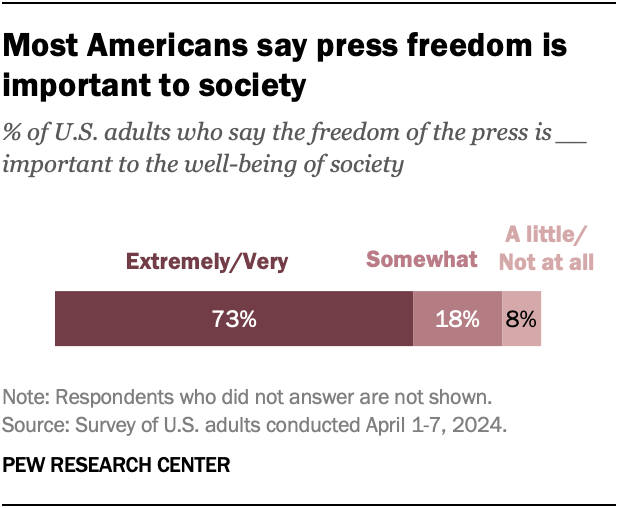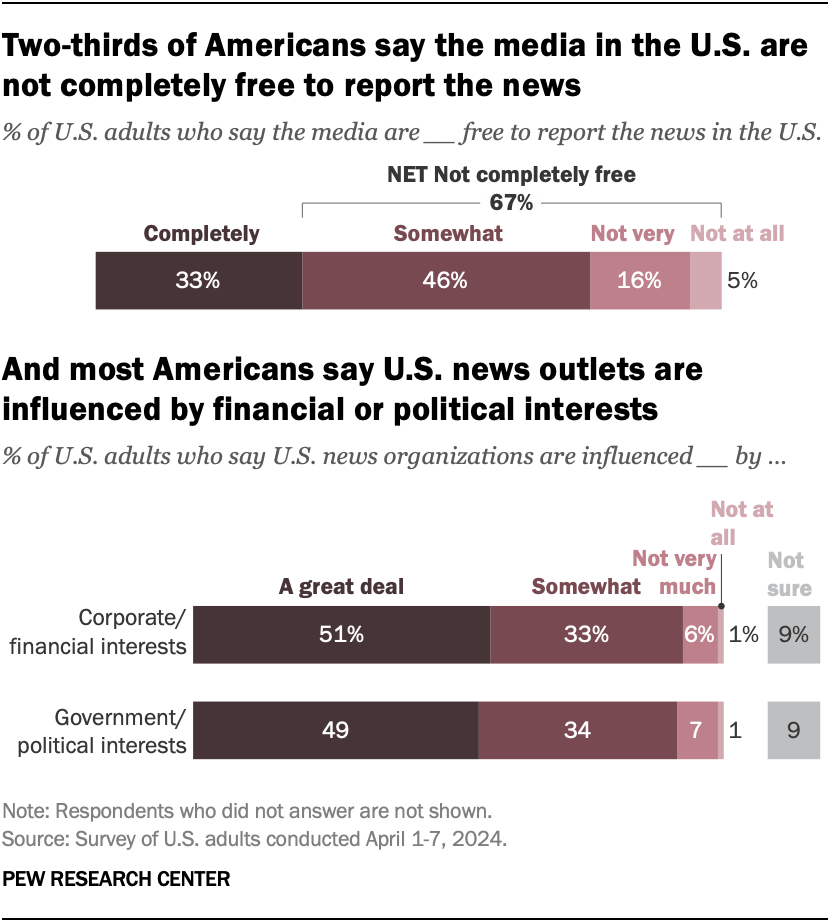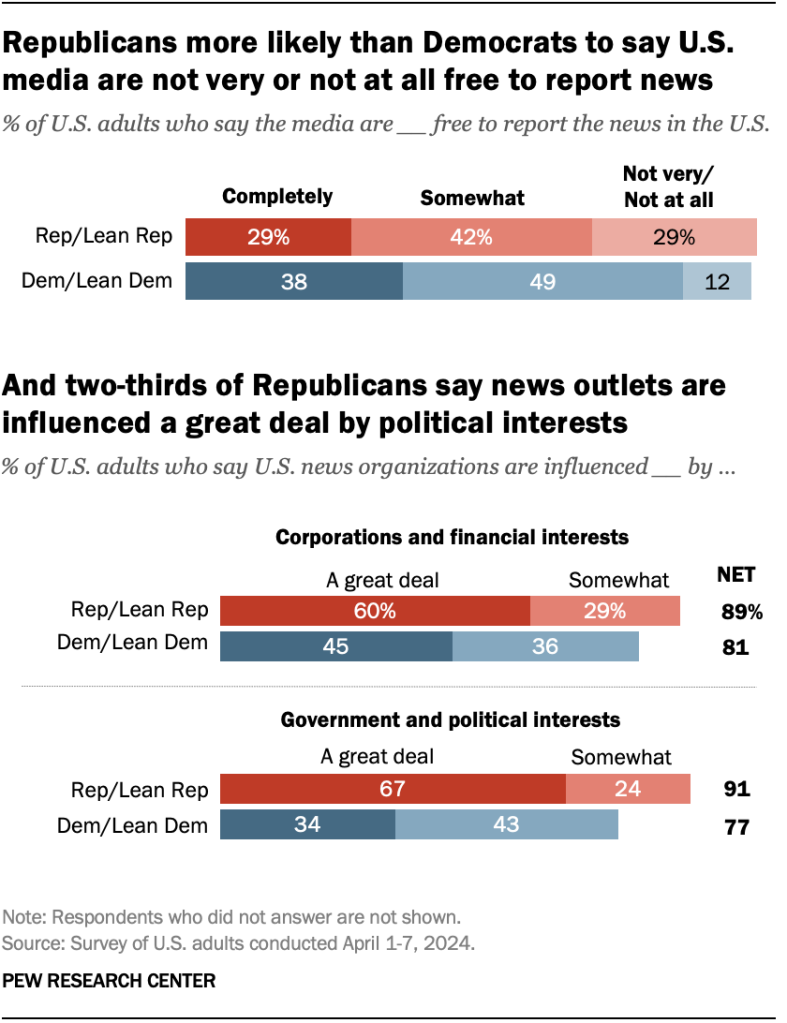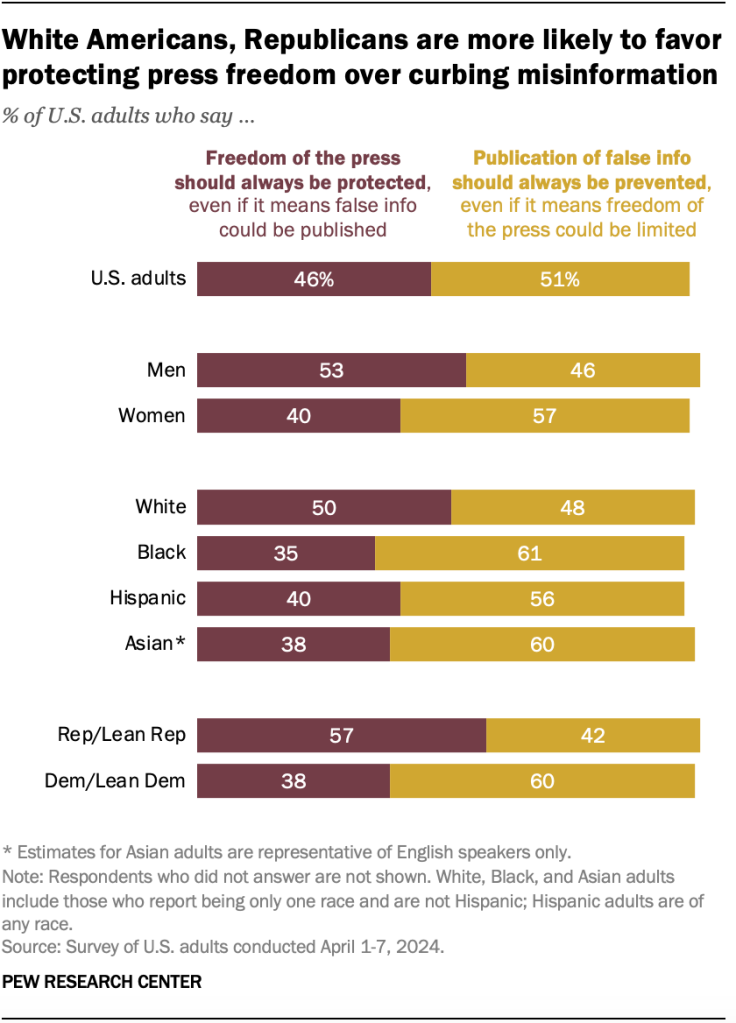A large majority of Americans see the freedom of the press as highly important to the well-being of society. But many express concerns about potential restrictions on press freedoms in the United States – and say that political and financial interests already have a lot of influence on news organizations. These findings come from a new Pew Research Center survey ahead of World Press Freedom Day on May 3.
To examine Americans’ perceptions of press freedom in the United States, Pew Research Center surveyed 3,600 U.S. adults from April 1 to 7, 2024.
Everyone who completed the survey is a member of the Center’s American Trends Panel (ATP), an online survey panel that is recruited through national, random sampling of residential addresses. This way nearly all U.S. adults have a chance of selection. The survey is weighted to be representative of the U.S. adult population by gender, race, ethnicity, partisan affiliation, education and other categories. Read more about the ATP’s methodology.
Here are the questions used for this analysis, along with responses, and its methodology.
Pew Research Center is a subsidiary of The Pew Charitable Trusts, its primary funder. This is the latest analysis in Pew Research Center’s ongoing investigation of the state of news, information and journalism in the digital age, a research program funded by The Pew Charitable Trusts, with generous support from the John S. and James L. Knight Foundation.

Nearly three-quarters of U.S. adults (73%) say the freedom of the press – enshrined in the First Amendment to the U.S. Constitution – is extremely or very important to the well-being of society. An additional 18% say it is somewhat important, and 8% say it is a little or not at all important.
Some demographic groups are more likely to view press freedom as highly important to society. For instance, White and Asian Americans (78% each) are more likely than Hispanic (61%) and Black (60%) Americans to say it is extremely or very important. U.S. adults with more formal education and higher income levels also are significantly more likely than those with less formal education and lower incomes to say this.
There are no major differences by political party.
Views of press freedom and potential restrictions
Most U.S. adults (79%) believe the media are at least somewhat free to report the news in the country. However, only a third say they’re completely free to do so. About one-in-five Americans (21%) say the media are not very or not at all free to report the news in the U.S.

At the same time, large majorities of Americans believe that U.S. news organizations are at least somewhat influenced by corporations and financial interests (84%) or by the government and political interests (83%). This includes about half of Americans who say news organizations are influenced a great deal by financial interests (51%) or by political interests (49%).
Fewer than one-in-ten U.S. adults say news organizations are not influenced very much or at all by financial (6%) or political (8%) interests.
Recent high-profile incidents such as a police raid on a Kansas newsroom and a government seizure of a Florida journalist’s materials have raised questions about press freedom in the U.S.
Regardless of how free they think the press currently is, 41% of Americans are extremely or very concerned about potential restrictions on press freedoms in the country. An additional 29% are somewhat concerned.
Journalists themselves are especially worried about possible restrictions on press freedom. In a 2022 survey of U.S. journalists, a majority of those surveyed (57%) said they were extremely or very concerned about this.
Partisan differences in views of press freedom
Some aspects of the debate over press freedom have been divided by political party in recent years. For example, former President Donald Trump has been adversarial toward journalists, and Republicans have long alleged that social media sites censor some political viewpoints.

In the new Center survey, Republicans and independents who lean toward the GOP are consistently more likely than Democrats and Democratic leaners to express concerns about press freedom.
For instance, Democrats are more likely than Republicans to say the media in the U.S. are completely free to report the news (38% vs. 29%), while Republicans are more likely than Democrats to say the media are not very or not at all free (29% vs. 12%). And 47% of Republicans say they are extremely or very concerned about potential restrictions on press freedoms, compared with 38% of Democrats.
Republicans are also about twice as likely as Democrats to believe political interests have a great deal of influence on U.S. news organizations. Two-thirds of Republicans say this about political interests, compared with 34% of Democrats. Six-in-ten Republicans and 45% of Democrats say financial interests have a great deal of influence on U.S. news organizations.
Protecting press freedom versus preventing misinformation
While Americans largely value the concept of press freedom, they are more evenly divided when it comes to the tension between protecting a free press and preventing the spread of misinformation.

About half of U.S. adults (51%) say that the publication of false information should always be prevented, even if it means press freedom could be limited. Meanwhile, 46% of Americans say press freedom should always be protected, even if it means false information could be published.
The groups that are more likely to say press freedom should always be protected include:
- Men: 53% of men say this, compared with 40% of women.
- White Americans: Half of White adults say press freedom should always be protected; 35% of Black adults say the same.
- College graduates: U.S. adults with at least a bachelor’s degree (53%) are more likely than those with a high school diploma or less (38%) to say press freedom should always be protected, even if it means false information can be published.
- Republicans: 57% of Republicans say this, compared with 38% of Democrats.
These partisan differences align with a previous Center study that found that Democrats are much more likely than Republicans to support interventions by the U.S. government or technology companies in moderating false information online.
Note: Here are the questions used for this analysis, along with responses, and its methodology.
Research Analyst Naomi Forman-Katz and Research Assistant Christopher St. Aubin contributed to this analysis.